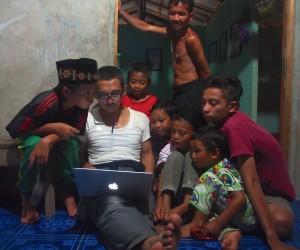Over sixty-five million Indonesians live off the grid. But what does that mean in the era of micro-grids, batteries and efficient solar panels? And how do communities change with 24/7 energy?
Providing reliable electric power is one of the keys to unlocking the potential of the remote islands and landlocked areas of Indonesia and of Australia’s north, a priority for both countries.
But there’s much more to it than installing the right mix of technologies. Bringing night-time activity, television, the internet and smart machines within the reach of people who have never had access to them before involves huge, potentially disruptive changes to their daily lives, their economic and political relationships, their whole culture.

A team of Australian and Indonesian scientists and social scientists is coming to grips with the scope of the problem by studying two sites in Indonesia where a start has already been made on introducing electricity. The seed project is financed by the Australia Indonesia Centre.





